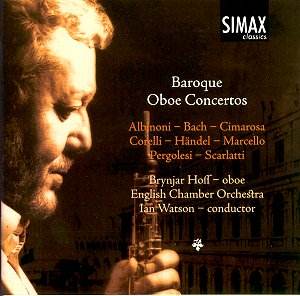These discs were originally
recorded in 1989 and 1993 and issued
separately. The first disc was given
a cautious welcome by John Duarte in
the Gramophone in 1990. Simax have now
issued them together and they form a
fine tribute to the art of veteran Norwegian
oboist Brynjar Hoff. Hoff celebrated
his 40th anniversary as a
professional in 1995.
Hoff has a gorgeous,
rich tone and is able so spin a wonderfully
supple line, apparently endlessly. His
oboe playing is always a pleasure to
listen to. The problem players like
Hoff have is that there is a large hole
in the oboe repertoire, so that though
Hoff’s fine technique is essentially
romantic, he must concentrate his solo
playing on baroque and contemporary
items.
There is a charming
whiff of yesteryear about this recording.
The selection of baroque concertos includes
the classic oboe concerto by Alessandro
Marcello, four concertos by Albinoni
and two concertos attributed to Handel.
These latter two are interesting as
the scores have rather dubious pedigrees
and so the concertos are not so often
played; strictly these Handel items
are not concertos at all but concerti
grossi which happen to have a singularly
prominent oboe part.
Speeds are usually
quite steady, even in the faster movements,
and Hoff never really gives us any virtuoso
display. His concern seems to be with
beauty of line and continuity of tone.
He has an old-fashioned virtuoso’s concern
to use the music to display his own
talent just as much as using his talent
in the service of the music.
In addition to these
genuine baroque items Hoff plays Sir
John Barbirolli’s concerto based on
his orchestrations of Corelli violin
sonatas (created for Evelyn Rothwell,
Lady Barbirolli) as well as Barbirolli’s
concerto based on themes of Pergolesi.
These concertos work very well as solo
display items but Barbirolli’s orchestration,
tactful though it is, is very much of
its era and is hardly baroque.
The same can be said
for Gordon Bryan’s Concerto based on
Scarlatti harpsichord movements; the
work seems to say much more about Bryan
than it does about Scarlatti. Perhaps
the best of these old/new concertos
is Arthur Benjamin’s concerto on themes
of Cimarosa. This wears its baroquery
lightly and Benjamin’s orchestration
is a charming example of English 20th
century neo-classicism.
These 20th
century confections are delightful pieces,
providing you are not expecting real
baroque music. Hoff and the ECO bring
out their charm and, slight though they
are, you can understand how oboists
have used such works as crowd-pleasers.
A disc comprising just the Bryan, Barbirolli
and Benjamin items would have been an
utter delight.
Unfortunately the players
barely change their style for the older
pieces. The ECO plays in some sort of
generic, one-size-fits-all way. They
are very stylish, with crisp playing
and plenty of bounce, but the overall
effect is given something of a romantic
sheen. Ian Watson makes an efficient
music director, but I felt that the
dominant personality was Hoff’s. His
technique is essentially classical/romantic
so one can’t really complain if he plays
Marcello and Albinoni the way he would
play Mozart.
Perhaps that is not
the point. If you can put your nit-picking
hat away and just sit back, then there
is much to enjoy on this disc, notably
the seductive tone of Hoff’s oboe playing
and his apparently effortless technique.
Robert Hugill












